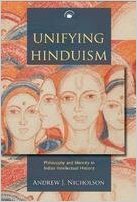Andrew Nicholson’s Unifying Hinduism:Philosophy and Identity in Indian Intellectual History is an ambitious work, closely and densely argued, from which, as a scholar working on North Indian bhakti traditions and on Indian Modernity, I have learnt much. This review lays out some of what I have learnt and some of my doubts and queries. Of the work’s ten chapters, nine are concerned with the early modern polymath and philosopher Vijnanabhikshu, who flourished some time after 1550, somewhere in north India, a time and place not awarded due attention, as Nicholson points out, in discussions of Indian philosophy, which tend to leap from the ‘classical’ straight into the colonial and the modern. This is a gap Nicholson’s work seeks to fill. Vijnanabhikshu was deeply read into the ‘classical’ philosophical systems that had evolved on the subcontinent from early in the Common Era. Of Vijanabhikshu’s many works, Nicholson devotes the most attention to two commentaries, the Samkhyapravachanabhashya and Yogavartika, devoted respectively, as the titles indicate, to the Samkhya and Yoga schools of thought, as he understood them from his particular location in time and place.

Bridging a Disciplinary Chasm
Vasudha Dalmia
UNIFYING HINDUISM: PHILOSOPHY AND IDENTITY IN INDIAN INTELLECTUAL HISTORY by Andrew Nicholson Permanent Black, 2012, 280 pp., price not stated
September 2012, volume 36, No 9
